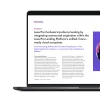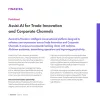Finastra TV
Explore the latest streaming content designed to inspire innovation and deliver transformation for the financial services industry
A consistent, seamless digital borrower experience
The Total Lending solution
Most comprehensive portfolio of end-to-end lending solutions in the market
Improve risk management
Industry standard for loan document compliance
Seamless experience
Consistent, seamless digital borrower experience for businesses, corporations & consumers
Easier lending
Improving customer onboarding, increasing transparency & streamlining back-office operations
Single platform for efficiency
360-degree view of all relationships and facilities under management
Fast ROI
Intuitive workflows & limited learning curve assures quicker employee adoption & faster ROI
Opening the doors of opportunity
Simplifying & automating processes while improving borrower experience.
Innovations that bring handshakes
Comprehensive end-to-end loan management software
Build deeper customer relationships
Bring new opportunities to life
Covering the full loan lifecycle
A single platform
Loan management software that reduces costs and brings efficiencies

Streamlining operations
A digital experience that reduces manual intervention and, therefore, risk and human error

Better customer experience
A smoother onboarding experience will help attract and retain customers


From draft to done: Seamless external collaboration with LaserPro Conductor Guest.



Finastra LIBOR Transition Calculator
With the replacement of the interest rate benchmark LIBOR to Alternative Reference Rates (ARR), banks and corporate borrowers must be prepared for this challenging and complex operational transition.
Let our Lending solutions work hard for you





